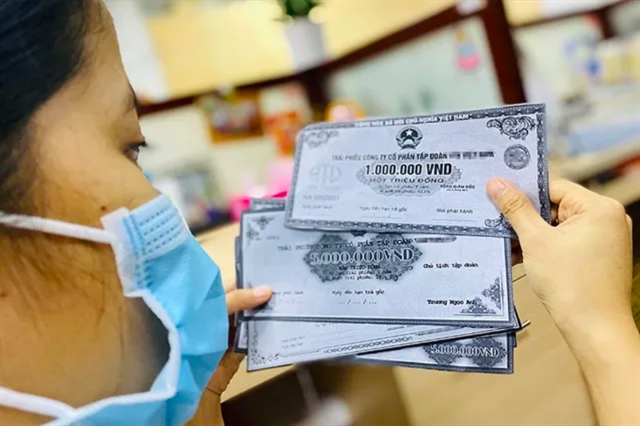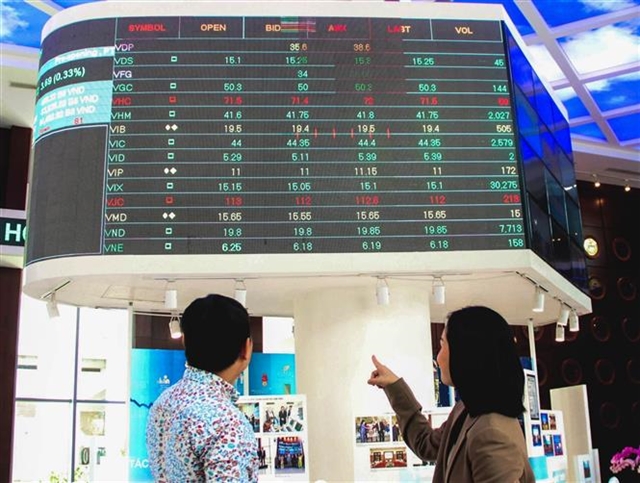 Economy
Economy

 |
| Investors watch a display at the HCM City Stock Exchange (HOSE). — VNA/VNS Photo |
HÀ NỘI — Placing restrictions for individual investors in buying and selling private corporate bonds is a step in the right direction, said market analysts and experts.
Still, it's important to ensure that capital flows from investment funds and other financial institutions stay undisrupted, they urged.
The draft securities law has been reported to restrict individual investors in the private corporate bond market, while facilitating foreign investors' activities. Only institutional investors will be allowed to trade corporate bonds, except for private bonds issued by credit institutions.
According to a recent report from FiinRatings, individual investors are especially vulnerable while trading corporate bonds issued by private companies, as they often lack standardisation and are largely based on negotiations and agreements, which heavily favour corporate issuers. On the other hand, institutional investors are significantly better equipped and have more experiences and knowledge to handle the risks associated with private corporate bonds.
According to FiinRatings, limiting individual investors' participation in the private corporate bond market aligns with international practices. FiinRatings cited China and Thailand as examples in which individual investors rarely directly own and trade corporate bonds, but they can still participate by investing through fund management companies.
Meanwhile, the rating agency said participation of foreign investors in the country’s private bond market remained limited. By the end of last year, foreign investors held just 3 per cent of corporate bonds, leaving a lot of growth potential.
The agency said along with placing restrictions on individual investors, the Government should conduct comprehensive reviews of current policies and improve transparency and investors’ confidence to remove difficulties for institutional investors to ensure a healthy in-flow of investment and minimise the risk of disruptions.
The report said Việt Nam's primary bond market in September 2024 recorded a total issuance value of VNĐ45.3 trillion (US$1.81 billion), a decrease of 27.5 per cent compared to the previous month, but an increase of 20.8 per cent on September last year.
Since the beginning of the year, corporate bond issuance in the Southeast Asian country reached VNĐ313.6 trillion, a 57.9 per cent increase compared to the same period last year, signalling a rapid recovery in the corporate bond market, with both private and public bonds recorded growth of 62 per cent and 28.1 per cent, respectively year-on-year.
However, the report said a large part of the market’s activities was driven by the banking sector, with few issuers from other sectors for a total tally of just north of VNĐ80 trillion, a 26.3 per cent decline compared to the first nine months of 2023.
The report said the delinquency rate in the market has been slowing down, currently at 18.9 per cent thanks to improved macro-economic conditions and the recent expansion of credit limits, which helped support corporates’ cash flow management.
"Most problematic corporate bonds belong to companies that have been struggling to make payment deadlines for a while as their financial health weakened over the past few years," said the report.
Corporates have been buying back fewer bonds with September’s buyback reaching VNĐ11.8 trillion, a 26 per cent decrease compared to the previous month and a 22.7 per cent decrease compared to the same period last year.
Of which, a significant portion was bank bonds, which accounted for 69 per cent of the value in September and 77 per cent for the first nine months. Other non-bank issuers have been buying fewer bonds in the last quarter compared to the previous one, despite a large number of bonds that will mature by the end of the year.
In the secondary market, bond trading reached VNĐ93.4 trillion in September with banking and property sectors accounting for 40.5 per cent and 33.9 per cent, increases of 25.3 per cent and 40 per cent, respectively, compared to the previous month. — VNS




